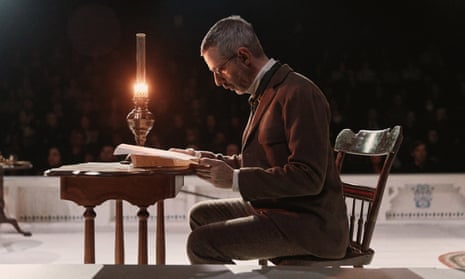
An Enemy of the People review – Jeremy Strong impresses in timely Ibsen drama
Circle in the Square Theater, New York
The Succession star delivers a bravura central turn in a rousing adaptation of a story that carries a discomforting contemporary relevance
For most people, the draw of An Enemy of the People, Sam Gold and Amy Herzog’s Broadway adaptation of the Henrik Ibsen play, is not so much the chance to see a lesser-known work by the Norwegian dramatist updated for the present so much as the chance to see Jeremy Strong. The ex-Kendall Roy is shedding his suffusive, serious image as Succession’s ex-No 1 boy – or, more accurately, drowning it, as promotional materials show him submerged in a tub – via the stage, in a serious, provocative morality play bound in the decorum of the distant past.
Still, there are flashes of HBO’s political drama du jour in this 19th-century tale of competing agendas. Strong again plays a lone wolf in a tense sibling rivalry on a doomed crusade, albeit with more ethics as Thomas Stockmann, a provincial doctor in a small Norwegian town who discovers dangerous microbes in its water system. He suspects the bacteria, which require advanced (for the time) scientific instruments to detect, are the product of toxic run-off from new industrial tanneries, owned in part by his father-in-law (David Patrick Kelly); the near-certain likelihood of toxic infection – or, even worse, bad PR – imperils the town’s salubrious spas and thus its local economy, both overseen by his brother Peter (an imposing Michael Imperioli), the mayor.
This is all straightforwardly laid out; Herzog, who last year adapted Ibsen’s classic A Doll’s House, with Jessica Chastain, for Broadway isn’t concerned so much with the flow of facts as how they can be twisted by others, and toward our modern sensitivities. Strong again commands dialogue of blinkered enthusiasm curdled into elitist disgust, as his clear warning is shredded by other pressing, personal concerns – the economic impact of a two- to three-year shutdown on tradesmen such as Aslaksen (Thomas Jay Ryan), the razor-thin profit margin for a local newspaper dependent on happy subscribers, the pride hit of declaring the town a 19th-century superfund site, the fact that no one has gotten that sick yet. Feelings over facts, circa 1882. “Are you serious?!” Dr Stockmann says to one waffling townsperson, stricken with urgent, self-righteous disbelief. For a second, you see a flash of the 21st-century nepo baby fecklessly declaring his way or bust. (The play is funnier than you’d expect for such gloomy matters, with one running bit scoffing at Dr Stockmann’s tiny, invented “invisible animals”. Matthew August Jeffers, as the flimsy liberal Billing, is a comic highlight.)
Herzog and Gold want you to think about the present, though maybe not so specifically or scornfully. Gold has ably directed this version, on the thrust stage at the Circle in the Square Theater, to appear as old-timey; scenic design by the collective dots invoke the Nordic gentry – bespoke meals, inherited cutlery, the lighting of oil lamps used as natural, evocative transitions. (I have to note that, even in 19th-century garb designed by David Zinn, Strong is still wearing all brown.) But Herzog has significantly altered the text. There are superficial changes – Dr Stockmann is now a widower, for one, the flat character of his wife Katherine now folded into that of his loyal, overburdened daughter Petra (You’s Victoria Pedretti), a schoolteacher and staunch supporter, though the juiced-up part still amounts to just a sidekick role in both text and performance.
And there are more not-so-subtle inflections meant to appeal to our modern thicket of competing loyalties, psychic bargains and political tangles; the fundamental, scary truth that all of us are acting just as much, if not more, to feeling than to reason. And that in being right, you can also be wrong – a famous passage in which a frustrated Dr Stockmann compares the suitability of mutts to pure-bred poodles to justify his righteousness as a scientist, amended and delivered to the newspaper editor Hovstad, played by the Black actor Caleb Eberhardt, takes on the tinge not just of superiority but eugenics.
That speech is delivered with the lights up, Strong standing atop the bar used for intermission, audience mixed among the townspeople – as overt as any invocation of the present, and sure to be a polarizing stage decision. It could be viewed as tacky (Linie, a Nordic spirit, is very clearly a sponsor; transitions are soundtracked by castmembers singing Norwegian folk songs). But there’s something to be said for erasing the line between stage and stands, spotlit and shaded, performer and audience, for seeing the reaction on the face of people – wide-eyed shock, grimace, gasp – who know just as much of what’s to come as you do. Just because a point is very on the nose doesn’t make it less salient (though that might be lost on the climate activists who have recently disrupted shows).
Whether such directness is successful in imparting something beyond the thrill of live performance – the cascading second half is, as expected, a showcase for Strong’s ability to portray a man on the brink – is, perhaps, up to the viewer. The appliqué of dialogue clearly invoking our current denial to 1880s Norway is at times jarring, at times moving, but in the hands of some veteran actors and immersive staging, at least a night of good New York theater.
Source: theguardian.com



